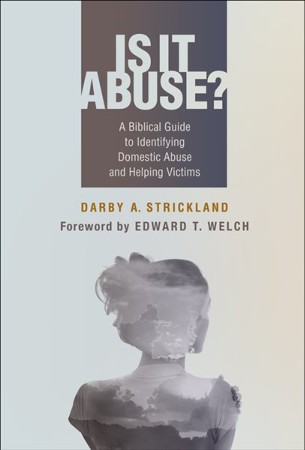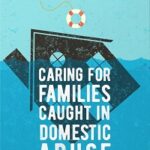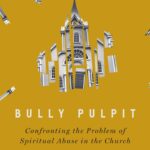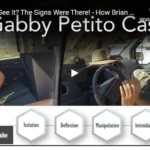I have been benefiting recently from Darby Strickland’s book, Is it Abuse? A Biblical Guide to Identifying Domestic Abuse and Helping Victims. In the book she challenges Christians and the church to be a refuge for the abused, a place where they can find help and get wise counsel. She cites Psalm 82:3-4, “Give justice to the weak and the fatherless; maintain the right of the afflicted and the destitute. Rescue the weak and the needy; deliver them from the hand of the wicked.”
What is Abuse?
Strickland explains that when we have not been in an abusive relationship, it is hard for us to imagine what it is like. In abusive relationships, there is a power dynamic where oppression takes place. “Abuse occurs in a marriage when one spouse pursues their own self-interests by seeking to control and dominate the other through a pattern of coercive, controlling, and punishing behaviors.” (p.24) This oppressive environment is the opposite of the humility and service that Christ calls husbands to. Statistics show that 85% of the victims are women.
The prevalence of the problem is staggering. According to the National Center for Injury Prevention and Control’s Division of Violence Prevention, one in four women experience severe physical violence from an intimate partner. Strickland says that for every hundred people in your church, there are likely to be five women who are experiencing physical abuse and twenty who are emotionally abused. She has written this book not only because of the prevalence of abuse but because of its complexity.
In abuse cases, “[T]hings are rarely the way that they outwardly appear.” (p.33) Abuse is often hidden.
Most often, when we encounter abuse, it is subtle. Any one instance or occurrence of most behaviors can be explained away or dismissed. To answer the question ‘Is it abuse?’ we need to determine whether such an event is part of a much broader system of oppression. (p.25)
Strickland uses the example of a husband who drives too fast. Is he simply rushing to church or is this abusive behavior? To see if that is abusive, we need to look at the effect of his behavior on the wife. What is the husband trying to accomplish? How often does this occur? When does it occur? Does it change the wife’s future behavior? Can the wife express her feelings without being punished.
Understanding Characteristics of the Oppressor
Strickland explains that “[i]t is essential to understand up front that oppressors are deceptive and are usually masters at disguising what they are doing.” (p.33) Even a victim will be confused as to what is really happening to them. The oppressors often appear normal to those in the church. It can take months or years before a victim is able to see through the fog and address their oppression. Strickland says abusers deceive others and also deceive themselves. We can not rely on their words.
I began to learn more about abuse and how the heart of the oppressor was that of an entitlement mentality. They use fear to get their way. In understanding a person’s story, we need to look for patterns and not just isolated incidents.
Oppression in marriage is about coercive control. Strickland mentions that an abuser is not one whose anger is out of control, but rather their anger is very much under their control. They use anger to create an oppressive environment and maintain control. They can also turn off their anger when it doesn’t suit them and everything is normal. This is why you will almost never see an abuser in the act of inflicting harm or threats. You can only observe the wounds (physical, mental, emotional, spiritual) they leave behind.
We know that God can do anything, but the majority of abusers (over 90% by many estimates) do not change, especially when the sin patterns are more deeply engrained. Abusers are good at faking repentance and even hide in churches using Scripture and acting normal. “One fundamental truth we as helpers need to know is that we can not solve oppression, and we cannot make it stop.” (p.33)
Identifying and Assessing for Abuse
Are you aware of the symptoms of abuse? Strickland gives us tips on spotting symptoms of abuse. These include physical anguish, shame, faith struggles, hypervigilance, intrusions, avoidance and overwhelmed emotions. (p.83)
Abusive entitlement screening questions (p.75) can be an aid to helpers trying to discover abuse. In listening to victims, Strickland will often ask victims questions several times from different angles to understand an oppressor’s entitlement. Questions such as: Are you afraid to disagree with your spouse? What happens if you let him down? In later chapters, Strickland provides detailed inventory questions to allow helpers to screen for physical, sexual, emotional, spiritual, and financial abuse.
Strickland addresses some common misconceptions about abuse. An abuser does not need to hit a victim to be an abuser. If they escalate to the point of physical abuse, there is almost always emotional, sexual, psychological, spiritual, financial and other types of abuse already present in the relationship. Physical abuse need not leave a mark or cause pain. It includes actions such as refusing someone sleep or medical care.
It may be surprising that emotional abuse is very often more devastating to victims than physical abuse. Lundy Bancroft is quoted in Strickland’s book stating, “[A]mong women who have experienced violence from a partner, half or more report that the man’s emotional abuse is what is causing them the greatest harm.” (p.289) She explains further, “Do not be tempted to assess the severity of a victim’s abuse and her need for protection based solely on the injuries her body has sustained; take into account all the nefarious acts – the gaslighting, cruel words, manipulation, indifference, injustices and isolation – that you have uncovered.” (p.289-290)
Suggestions for Helping a Victim
One of the most helpful things helpers can do is to help victims practice agency. As image bearers of God, victims must learn to break out of oppression and find freedom when they are ready. Helpers may be tempted to act on behalf of victims and try to rescue them. However, helpers need to respect the decisions of victims and help victims understand that tough choices may be painful. The victim has to pick their pain when there are no easy options.
Strickland suggests that a care team should be assembled whose main goal is to protect the victim. Strickland explains that helpers can often do more damage and be used by an oppressor to enforce his agenda. Rather than calling the wife to submit to her husband without knowing all the facts, we need to be patient in dealing with victims who may have a hard time understanding what is even happening to them.
Because abusers often deceive even their victims and victims experience the impact of trauma, dealing with the oppressed requires great patience. Abusers can turn on repentance and are experts at looking contrite and normal. Sadly, the trauma, gaslighting, and blame shifting can impact a victim’s ability to get out of the web of deception. Maybe I’m not being a good enough and submissive wife? Maybe I’m too sensitive and my abuser is right to blame me? Sadly this can be reinforced by Christians counseling a victim to submit to or forgive their husband or look at their contribution to the conflict.
When it comes to helping victims get to safety, Strickland writes that “a victim should not be made to feel the need to wait until her oppressor’s violence intensifies before she responds to it or asks for help.” (p.127)
Another thing I learned was instead of asking a victim when she’s going to be ready to relax her boundaries, the focus should be on if we’re seeing fruit of repentance from the abuser. A repentant abuser will respect boundaries and not push for them to be changed before the victim is ready. In speaking with a victim, we should ask them what they think repentance would look like in an abuser. This way we are not fooled by the counterfeit repentance of a King Saul or Gollum. Obviously a victim is a sinner too, but she is not responsible for her abuse. There may be a future time to more closely examine with her how she has contributed to conflict, but her safety should be the first priority.
Reasons Why Christian Helpers & Conciliators Make Mistakes
As I grew in my knowledge of abuse I thought of why it’s easy for Christians who want to help to make mistakes. Reasons include our passion for the unity of marriage, desire to see forgiveness and grace given and hope that a person would change. What we perhaps fail to account for is how deceptive abusers can be with their words and actions. And I’ve heard from victims that “words mean little” to them. Fake repentance is a very real thing.
Extending forgiveness without requiring repentance is one of the errors Christians can make. In “The Cost of Discipleship,” Dietrich Bonhoeffer says this: “Cheap grace is the preaching of forgiveness without requiring repentance, baptism without church discipline, Communion without confession, absolution without personal confession. Cheap grace is grace without discipleship, grace without the cross, grace without Jesus Christ, living and incarnate.” Christians should distinguish the difference between having an attitude of forgiveness versus extending forgiveness, a transaction which occurs only after repentance and ownership of sin has taken place.
As a Christian man, I often like to take action and fix things. I see a problem and I want to fix it. I want resolution. I assume others will repent when confronted with the impact of their actions. I fail to be wise with regard to the reality of evil. I’ve been taught Biblical concepts such as “speaking the truth in love.” Strickland warns us: “In a church setting, people are often tempted to confront oppressors and to call them to repentance. Do not do this unless the oppressed spouse is comfortable, protected, and prepared.”(p.113.) Strickland talks about developing safety plans for women and calling in the experts.
As a man it is natural to more easily relate to the man’s story in a conflict. Having wise and trusted women involved in these situations can help guard against the potential pitfalls of an all-male elder or deacon board seeking to help in these fragile situations, and it can help create an environment of safety for a female victim.
Many Christians assume that divorce is always the worst outcome, but a fuller theology of divorce would also see that it can be God’s means of protection for a victim. As one counselor has stated, all divorce is a result of sin but not all divorce is sinful. Pastors need to study what the Bible says about divorce and be ready to give wise counsel. They need to help victims discern the path of wisdom and love.
As I grow in my knowledge of abuse, I’m still aware of how little I know. Strickland reminds me of the importance of bringing in professionals, such as Biblical counselors who have dealt with abuse, narcissistic disorders, and potential for violence.
Why Mediation is Usually Not Appropriate in Abuse Cases
As I grappled with how to best serve a couple where abuse dynamics were present, a friend and Christian counselor shared that his general rule is that he does not conciliate abuse dynamics unless there has been repentance and the naming of the abusive/power/control behavior by the oppressor. There are times where he has approached it differently, but it is because a victim has requested it.
As I read more about the matter, I discovered that the gold standard for abuse cases is not to do joint marriage counseling but to do individual counseling. I learned that helpers, pastors, counselors, and Christian conciliators must protect the confidentiality of the victim and refuse efforts of the abuser to disclose what was discussed with the victim.
An unrepentant abuser will use the mediation process to take advantage of the victim. A victim is not free to be honest in a joint counseling or mediation environment because she knows there will likely be repercussions for what she says later when they are in private. Victims desperately need us to listen to their story and take them seriously. I didn’t fully understand how deceptive abusers can be and the power they can wield in a mediation. They can appear to be normal to most of the watching world.
As a Christian conciliator and mediator, one of the things I plan to change is my intake process, to be able to use some of the screening questions Strickland lists on page 75, or Leslie Vernick’s relationship test questions when we sense that there are abuse dynamics.
In the tough work of helping victims, my prayer is that you will find great reward given to you by the Lord, the God of Israel, under whose wings you have come to take refuge.







